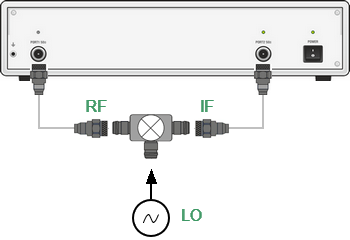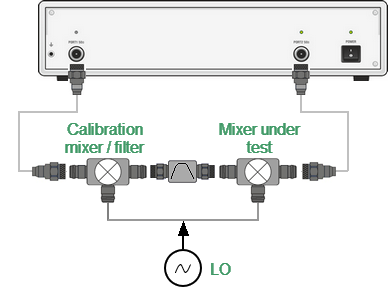Mixer Measurement Methods
The Analyzer allows to perform measurements of mixers and other frequency converting devices using scalar and vector methods.
The scalar method allows measurement of the scalar transmission S-parameters of frequency converting devices. Phase and group delay measurements are not accessible in this mode. The advantage of this method is the simplicity of measurement setup (no additional equipment necessary). Scalar mixer measurement setup see figure below.

Scalar mixer measurement setup
The scalar measurement method is based on frequency offset mode. Frequency offset mode enables a frequency offset between the Analyzer test ports, as described in detail in Frequency Offset Mode. Frequency offset mode can be combined with various calibration methods.
When performing scalar measurements of a mixer, the most accurate method of calibration is scalar mixer calibration (See Scalar Mixer Calibration).
An easier but less accurate method is using absolute measurements in combination with receiver calibration and power calibration (See Absolute Measurements, Power Calibration, Receiver Calibration). This method often results in transmission S-parameter ripples due to mixer input and output mismatch. This can be partially compensated by using matching attenuators of 3-10 dB at the mixer input and output.
The vector mixer calibration method allows measurement of mixer transmission complex S-parameters, including phase and group delay. The method requires additional equipment (See figure below): an external mixer with filter, which is called a calibration mixer, and an LO common for both the calibration mixer and the mixer under test.

Vector mixer measurement setup
The vector mixer calibration method doesn’t use frequency offset. This method ensures the same frequency at both test ports of the Analyzer in normal operation mode. The vector mixer calibration procedure is described in Vector Mixer Calibration.